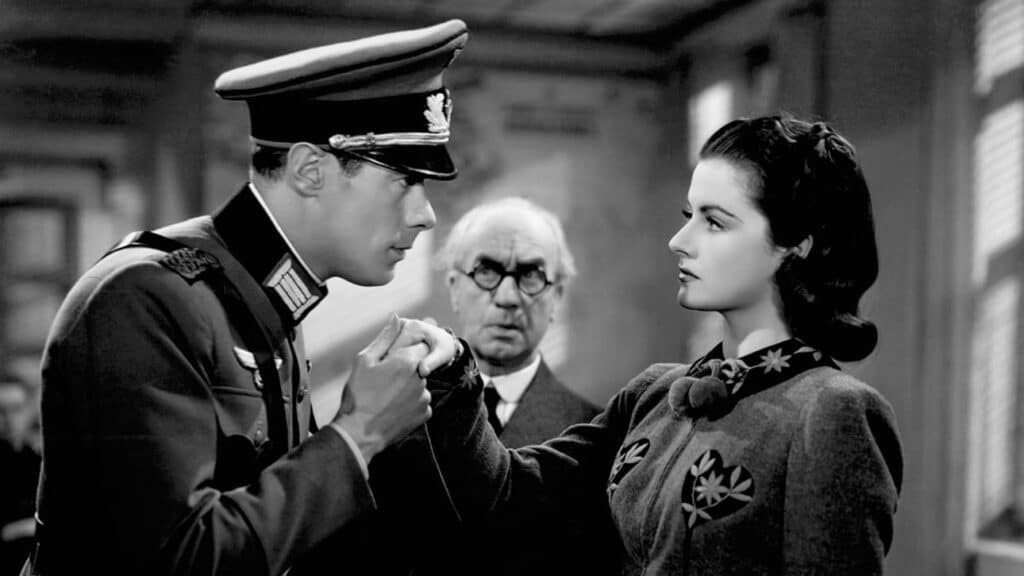5. 49th Parallel (1941)
The survivors of a sunken U-boat invasion are forced to journey across Canada, attempting to make it to the border of the still-neutral United States so that they can escape internment and demand passage back to Germany. On the way, they encounter a rural-minded French Canadian (Laurence Olivier), who has just learned that his country is at war and can’t understand why Canada is defending “a bunch of Poles”. Johnny has just reassured himself that the war is a long way from Winnipeg when the Germans burst through the door searching for food and weapons. Attempting resistance, Johnny is shot dead.
Having as its protagonists a gang of Nazi marauders, Michael Powell’s 49th Parallel sought to expose the hateful and brutal nature of their weltanschauung against the palpable contrast of peaceable and multi-ethnic Canadians. It was also a kind of parable, partly funded by the British government, and targeted at an isolationist public in the United States, sceptical about their country’s need to involve itself in what, before Pearl Harbour, many Americans saw as a purely European affair.
4. Sherlock Holmes and the Secret Weapon (1942)
Basil Rathbone and Nigel Bruce are unparalleled as Holmes and Watson. Their film series was inaugurated in 1939 with the release of The Hound of the Baskervilles (Sidney Lanfield). Naturally, once the United States entered the War and Hollywood turned its attention to propaganda, their adventures were updated as they were co-opted into the fight against Nazism.
The most entertaining of Holmes’s wartime escapades is Roy William Neill’s Sherlock Holmes and the Secret Weapon, in which he uses a disguise to extract a Swiss scientist from under the noses of the Gestapo, subsequently guarding the latter’s destructive invention from Moriarty, who has been engaged to obtain it for the Germans.
As propaganda, Sherlock Holmes and the Secret Weapon is on the more blatant side, ending with a patriotic recitation of John of Gaunt’s “this England” speech from Richard II by Rathbone. But it is also brilliant fun.
3. Night Train to Munich (1940)
Alfred Hitchcock spent the War in Hollywood, depriving the Ministry of Information of his talents, so Carol Reed decided to make them a Hitchcock pastiche instead. He borrowed Margaret Lockwood, the leading lady from Hitchcock’s The Lady Vanishes (1938), and Charters and Caldicott, the cricket-obsessed double-act who had appeared as stereotypical Brits in the same film. The latter makes a horrible mess by publicly recognising a British spy in Gestapo disguise (Rex Harrison) because he used to play for the Gentlemen when he was at Oxford. They courageously redeem themselves, however, and the cable car escape into Switzerland at the end of Night Train to Munich has a touch of James Bond about it.
2. The Life and Death of Colonel Blimp (1943)
Michael Powell and Emeric Pressburger‘s The Life and Death of Colonel Blimp is probably the only film on this list that can truly be described as a timeless masterpiece. The most subversive of propaganda films, Churchill wanted to have it banned, probably recognising himself in the ageing and hapless, if nevertheless likable, protagonist. The Life and Death of Colonel Blimp wasn’t particularly popular with those on the political Left either, owing to its sympathetic portrayal of Blimp (who was most certainly not the same idiotic and semi-fascistic Colonel Blimp of the Low cartoons).
At a time when much of the British establishment was in the grip of a “destroy Germany forever” mentality – Vansittartism, as it was named after its most indefatigable champion, Lord Robert Vansittart – Powell and Pressburger made a film about the enduring friendship between a British Colonel and a Prussian officer who had fallen in love with the same woman. In a brave endorsement of the “other Germany”, it is this Prussian “stiff neck”, played by Anton Walbrook, who delivers The Life and Death of Colonel Blimp’s most memorable moment, when, no longer a stiff neck but a broken old man, he pleads his case against internment as an “enemy alien” in Britain.
1. Pimpernel Smith (1941)
Leslie Howard had previously played Baroness Orczy’s Scarlett Pimpernel (Harold Young, 1934), an English aristocrat who donned disguises to rescue French aristocrats from the guillotine during the Reign of Terror. The Pimpernel avoided suspicion by cultivating a frivolous personality, underscored by an apparent obsession with fashion. Howard’s Pimpernel Smith was a reworking of Orczy’s character, but instead of a fop, Howard played a Cambridge archaeologist whose hankering after dead civilisations seemed to render him insensitive to the travails of his own.
Horatio Smith is less of an act than the eponymous Pimpernel. He keeps a photo of his one true love, the Aphrodite Callipygous, in his pocket, and he conducts real archaeological research, disproving – as he reveals in Pimpernel Smith‘s unforgettable final scene – the myth of the Aryan origins of the Germans. Not only, then, does he succeed in liberating the Nazis’ victims through his covert work, but he scores an intellectual victory over Hitlerism through his day job.
The best dialogue, as it should be, is saved for the scenes shared between Smith and the Gestapo agent hunting him. When General von Graum insists that Shakespeare was German, Smith’s retort – “Still, you must admit that the English translations are most remarkable” – provokes a curt “good night” from his irritated interlocutor. “Good night. Good night,” Smith replies. “Parting is such sweet sorrow.” After von Graum expresses bemusement at this farewell, Smith reminds him that he’s quoting “one of the most famous lines in German literature.”
Pimpernel Smith was cited as an inspiration by a real-life Pimpernel, the Swedish diplomat Raoul Wallenberg, while Howard was particularly proud to learn that the film had elicited a scathing broadcast from the British Nazi propagandist Lord Haw Haw. Some believe that Howard was the target, rather than an incidental victim when a passenger plane he was travelling in was shot down by the Luftwaffe in 1943.

